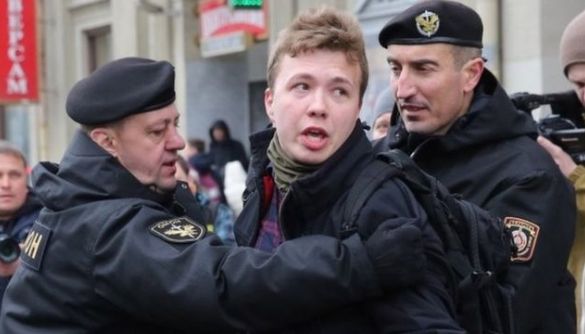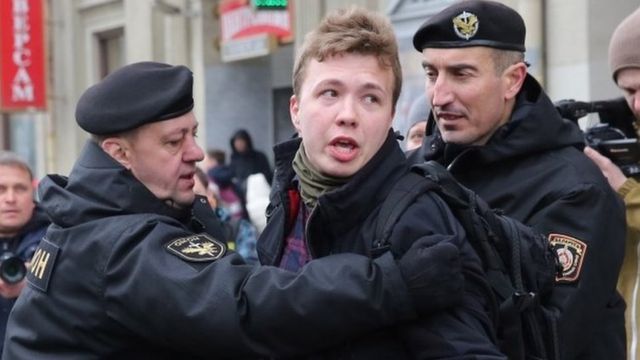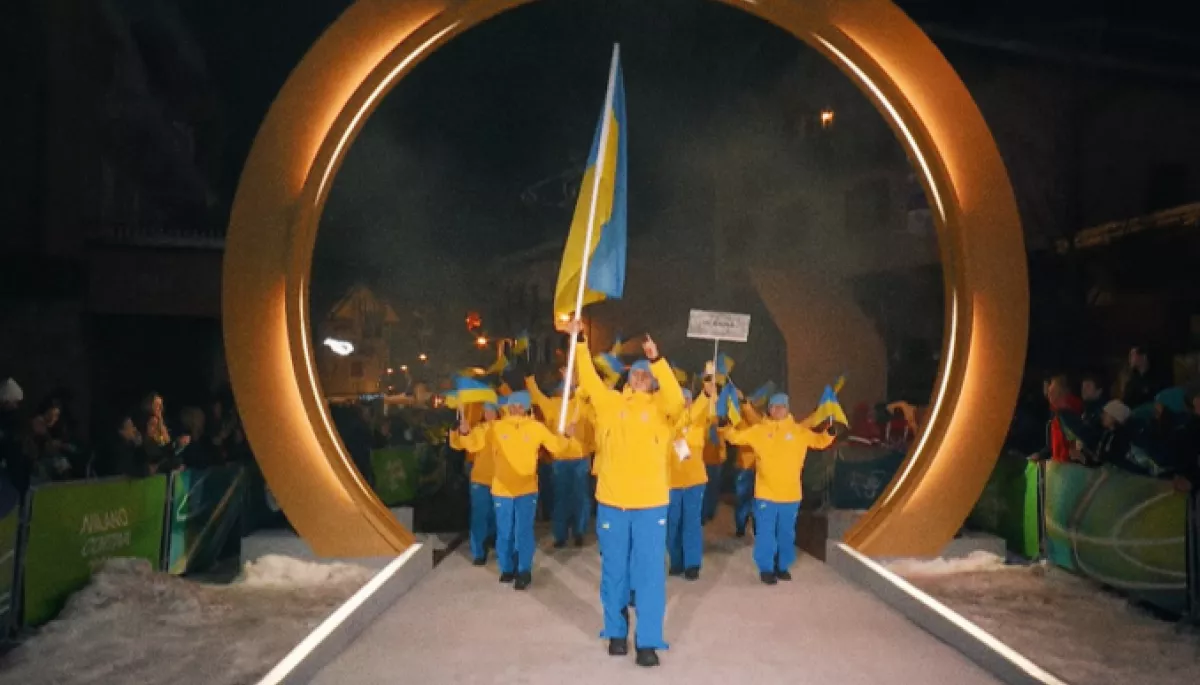
Belarus in peril: Statement by Ukrainian NGOs


Українською читайте тут.
We, the representatives of the NGOs, appeal to national and international designated institutions about the danger that has befallen the Belarusian people and the state of Belarus, and the threat of authoritarianism looming over the whole of Europe.
On May 23, 2021, as a result of illegal actions sanctioned by the self-proclaimed president of Belarus, Aleksandr Lukashenka, a Ryanair passenger aircraft was forced down in Minsk to illegally detain and arrest Roman Protasevich, the founder of the opposition Nexta channel on Telegram.
Aleksandr Lukashenka came to power in Belarus 27 years ago and, after the disputed elections in August 2020, he has continued to retain it by the suppression of political protest and the unprecedented persecution of politically active citizens. During his rule, Lukashenka has degraded the very concept of the separation of powers, facilitated the withdrawal of the Belarusian language from the public sphere, and eliminated all opposition to his regime. During this time, such fundamental democratic institutions as free and fair elections and independent media have been consistently eliminated in Belarus; proper protection of human and civil rights and freedoms has become impossible. Belarus is still not a member of the Council of Europe and, therefore, does not fall under the jurisdiction of the Convention for the Protection of Human Rights and Fundamental Freedoms and the European Court of Human Rights. The death penalty is still in use in Belarus. Belarus’s state television is a de facto copy of Soviet television with all its inherent tendency to polarize, lie and praise the country’s leader.
Frightened at the prospect of losing his untrammeled power, Lukashenka regularly intimidates citizens with “Maidans” and “Ukrainian fascism”. Opposition activists daring to take part in the protests have been brutally repressed and some killed. Without exaggeration, the Lukashenka regime can be compared with the dictatorial regimes of 1930-1950. Thus, international human rights organizations’ make statements about numerous infringements on human rights that can rise to the level of crimes against humanity – persecution and deportation. Specifically, there have been repeated calls to initiate proceedings against Lukashenka in the International Criminal Court. Amnesty International, an international human rights organization, has documented a number of systematically violated rights, including numerous cases of inhuman treatment and torture, suppression of freedom of expression and the effective elimination of the right to peaceful assembly. Recently, the situation has become even worse: new bans were issued regarding the media and coverage of protests. All this exists in the context of the constant threat of the death penalty. In addition, in the situation of the illegal, forced landing of a civil aircraft, not only has Belarus violated international human rights law (which still applies to it as part of customary international law and to the extent provided by the International Covenant on Civil and Political Rights), it has also violated the Convention on International Civil Aviation because, according to aviation law experts, using a jet fighter was a measure extremely disproportionate to the alleged threat.
Due to growing international isolation and unwillingness to leave power democratically, Lukashenka has entered into numerous political arrangements with Vladimir Putin, who has also been reluctant to relinquish power in Russia for more than two decades, switching pro forma between the positions of president and prime minister. The idea of the so-called “Union State” is nothing more than an attempt by the Russian Federation to slowly annex Belarus – a dangerous technology that Russia has repeatedly tried to apply in Ukraine, Poland and other states over the past three centuries. Thus, an entire state and its people with a long history and culture might disappear from the map of Europe in the near future. At the same time, it should be noted that any integration into the Russian Federation usually brings with it marginalization and complete assimilation for integrated peoples, including the loss of their own language and cultural traits.
Russia’s strategy is to use satellite states to maintain influence in the region and demonstrate power on a global level. Those resisting Russian political influence have got pseudo-republics within their sovereign territory: Transnistria in Moldova, Abkhazia and South Ossetia in Georgia, and occupied Crimea and part of Luhansk and Donetsk regions in Ukraine.
Europe and the world at large were late in providing a proper response to “Belarusian Milosevic”. Chamberlain’s “peace for our time” proved unsustainable. Dictators understand only the language of power – economic, political or even military. Especially so the dictators born of the totalitarian USSR, a country that exterminated tens of millions of its own citizens.
There are many people in Belarus holding the opposite views to Lukashenka’s, those who see their state as free, democratic and sovereign. Today, these people are in mortal danger as the ageing dictator – fearing responsibility and losing power – is increasingly dabbling in conspiracy theories looking for enemies not only outside the country but also within. Eastern Europe already knew an example of such a dictator, Joseph Stalin, whose government was responsible for the extermination of millions of innocent victims of the Soviet Union’s totalitarian regime.
The Independent Media Council already made a statement citing numerous cases of violations of journalists’ rights in Belarus and the actions to be taken by Ukrainian and foreign governments. No proper response was offered and today, the situation has become much more dangerous. The world must, therefore, respond in the harshest way possible to the unlawful tyranny of the Lukashenka regime, as well as provide the most help to those opposing such a regime and/or escaping from it, and working to protect human rights in Belarus no matter what to bring to justice those responsible for a mass violation of fundamental rights and freedoms (in particular, in the International Criminal Court on the basis of the UN Security Council Resolution). In this regard, the undersigned NGOs note the following:
- We demand the immediate release of Roman Protasevich and other political prisoners of the Lukashenka regime. We call on the governments and human rights organizations of all countries to do everything possible, including imposing sanctions against the official bodies and officials of the Republic of Belarus to release Roman Protasevich and other prisoners of conscience of the current regime in Belarus.
- We call on the governments of member states of the Council of Europe and the EU to impose sanctions not only on the Belarusian government, parliament, and judges but also on bodies such as the tax authorities – a favorite tool of economic pressure in the post-Soviet countries. Every law enforcement or tax officer must be thoroughly screened for harassment of independent media and the opposition when attempting to leave the country.
- We call on Ukraine and other countries to offer the widest possible support to refugees from the Lukashenka regime by simplifying, if possible, the procedure for obtaining temporary residence status, acting in accordance with international law, in particular the Convention relating to the Status of Refugees.
- We call on international organizations, both intergovernmental and non-governmental, to possibly immediately launch an investigation into the events in Belarus starting at least from August 2020 to provide a proper legal assessment of the systematic persecution of protesters and flagrant human rights violations to identify crimes against humanity and take further measures to bring the perpetrators to justice in accordance with the principle of universal jurisdiction over such crimes.
- We call on international intergovernmental organizations to consider the issue of responsibility of Belarusian officials for violating the Chicago Convention. We call on international freedom-of-speech organizations to ensure the safe evacuation of journalists if their lives or the lives of their families are in danger from the Lukashenka regime. We also call for the full support of the Belarusian media in exile, as long as they cannot exist in their homeland, in order to provide reliable and complete information about the events in Belarus.
- We call on NATO to enhance protection and combat capability in the region to protect its members and partners, in particular, countries bordering with Belarus and the Russian Federation, as a de facto “act of state terrorism” committed by the Republic of Belarus can provoke similar action by the authoritarian regimes, both in the region and globally.
- We call on the member states of the Council of Europe and the EU to provide Belarusians with all possible channels and sources of information, such as television, radio, online applications, and, where necessary, even Internet access through alternative, state-controlled networks. The need for such support has only increased due to the new legislative repressions against access to information in Belarus.
- We advise that Ukraine and other countries should immediately stop purchasing goods and services produced by Belarusian enterprises: both public and formally private entities associated with Belarusian officials. Because each hryvnia or euro paid means imprisonment and torture of Belarusian citizens for their trying to live in a democratic state, free from the KGB and dictators.
- We advise that Ukrainian civil society activists, journalists and the military should refrain from flying both over the territory of Belarus and to countries under the political influence of the Russian Federation, because, in case of a possible illegal seizure, they only become another means of pressure for dictators granting them blackmail opportunities in exchange for the return of “political hostages” to their homeland.
We are convinced that only a united Europe, with its palette of countries, ethnic groups and cultures, will be safe if there is no place for fascism, Nazism, populism and dictators on its territory. After all, cultures and values require not only expressions of deep concern, but also real, harsh reactions preventing any encroachment upon democratic values – not by words, but by deeds. And now is the time.
Independent Media Council
NGO Center for Democracy and the Rule of Law
NGO Detector Media
NGO Internews Ukraine
NGO Institute of Mass Information
NGO Souspilnist Foundation
NGO Institute for Regional Press Development
PU Center for Innovations Development
PU Human Rights Platform
VoxCheck
NGO Ukrainian Media and Communication Institute
Vostok-SOS
Center for Civil Liberties
Pylyp Orlyk Institute for Democracy
NGO Women in Media
All-Ukrainian NGO Commission on Journalism Ethics
Foreign Policy Council “Ukrainian Prism”
International Volunteer Community InformNapalm
ZMINA Human Rights Center
Euromaidan Press
NGO Institute for Information Security
Hromadske Radio
National Interests Advocacy Network Ants
Ukrainian Foundation For Security Studies
NGO Anti-Corruption Action Centre
Photo: EPA











